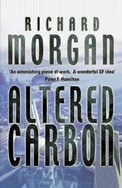
| Series: | Takeshi Kovacs #1 |
| Publisher: | Gollancz |
| Copyright: | 2002 |
| ISBN: | 0-57507-390-X |
| Format: | Mass market |
| Pages: | 534 |
Schwarzenegger meets film noir detective crossed with Blade Runner. Add a hefty helping of Neuromancer and you have Altered Carbon, a very visual first novel with a cinematic feel and a high body count. This is the novel equivalent of a high-tech action movie: the final confrontation features cutting-edge weapons, dramatic explosions, and lots of shooting.
Surprisingly, it's also a well-written book.
It's not an original book. Morgan wears his influences openly. But he also understands how to use the stock scenery of SF. The point of not inventing your own furniture is that you don't have to spend a lot of time explaining it. The reader is already familiar and comfortable, so you can leave the background in the background and focus on your characters and your few defining ideas. When handled well, the result is tight pacing and few infodumps, and despite the 534 pages, Altered Carbon never bogged down.
The defining idea here is the concept of sleeving, combining personality capture implants (reminiscent somewhat of the implants in Iain M. Banks's Look to Windward but with more retrieval options), a touch of uploaded personalities (the holodeck Matrix version, not the Singularity version), and the possibility of putting someone into someone else's body. That body probably belongs to someone convicted for a crime who is sitting out their sentence in electronic storage, during which they lose any rights to their original body. It's a disturbing and cynical idea that Morgan explores in detail, focusing on how the rich use it to achieve immortality and the less fortunate beggar themselves to try to get some of the benefits, or at least avoid ending up in hoc to the powerful. (As with most stories in this genre, there are the haves and the have-nots and not much inbetween.)
The hero, Takeshi Kovacs, is an ex-Envoy, a type of military special forces with special training in being beamed through space into random bodies on whatever world he's supposed to operate on. It's a good justification for why he's a bad-ass, since all sorts of military training can be called upon as a plot device to justify his fighting abilities, but it also adds to the dark cynicism of his first-person viewpoint. This is not a pretty or optimistic world, nor does it become more so over the course of the story. Kovacs gets a chance to help a few people who are down and out, but he's mostly looking out for his own interests and trying to get through the mystery he's forced to investigate.
Perhaps the best symbol of this story is the Hendrix, an AI hotel in downtown San Francisco that Kovacs gets a room at early in the story and uses as his base of operations throughout. It's one of the best characters in the story, delighting the reader in an early scene and hinting throughout at a complex and nuanced relationship between AIs and the government and elites. It's also an obvious plot device at multiple points, having just the right facilities or just the right access that Kovacs needs for some scheme. This mix of fun characters, beautiful visual set pieces, and occasionally heavy-handed plotting typifies the book and makes it feel very much like an expanded, well-written, big-budget action movie (if such a thing actually existed). If one inspects the plot too closely under the pile of bodies, splashes of blood, and flying fortresses, it's a bit too obvious and a bit too forced, but moves so quickly that one usually doesn't notice.
I liked the visceral action sequences a bit more than the convolutions of plot towards the end of the book, but mostly that's because Morgan starts expecting the reader to recognize characters by name that hadn't been seen for many chapters. A dramatis personae, or simply more narrative help, would have been nice towards the end. That and the occasionally too-graphic brutality and too-seedy sex scenes are the only parts of the book that turned me off. It's an action movie in book form, but it's a good one, and while this is the first of a series of books featuring Takeshi Kovacs, don't worry about cliffhanger endings or unresolved plots. This is a complete story with an end, and it won't leave you desperate for the next book.
Recommended, and given that this is a first novel, I'm guessing that I'll be able to recommend Morgan's later work even more strongly.
Followed by Broken Angels.
Reviewed: 2005-10-09